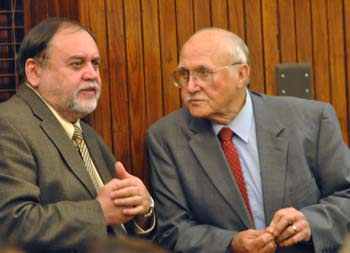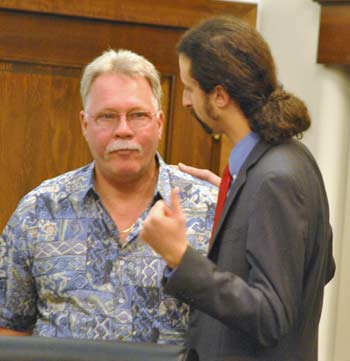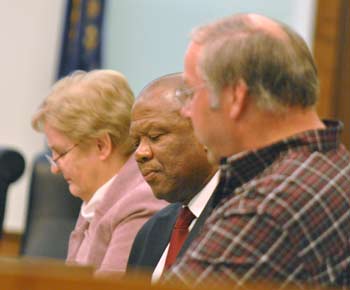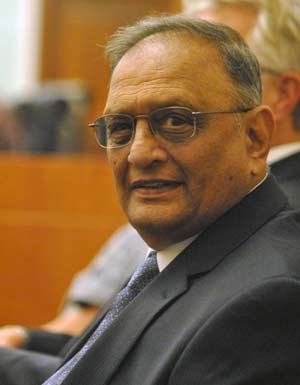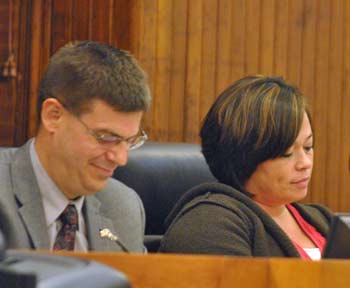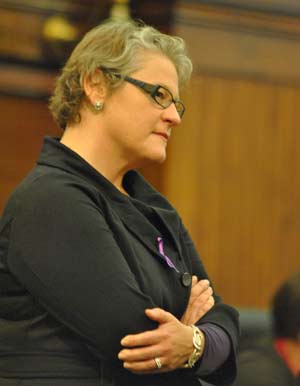County Board Debates Role in Transit Entity
Washtenaw County board of commissioners meeting (Oct. 17, 2012): With only two more meetings remaining in 2012 – both falling after the Nov. 6 election – county commissioners dispatched a range of agenda items on Oct. 17, including ordinance changes and budget-related action.
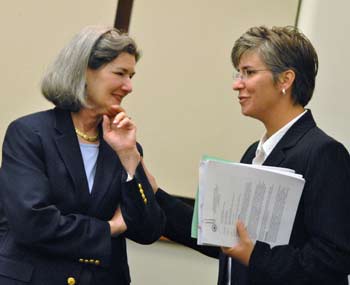
From left: Washtenaw County treasurer Catherine McClary and Mary Jo Callan, director of the county/city of Ann Arbor office of community & economic development. Both women attended the Oct. 17 meeting of the county board of commissioners to address agenda items. (Photos by the writer.)
But they spent much of their discussion on a topic not on the agenda and not requiring a vote: public transit. It emerged that the county administrator now will be sending out additional notification letters to local jurisdictions about a new transit authority, called The Washtenaw Ride. The AATA had initially sent letters notifying jurisdictions of a 30-day window ending Nov. 2.
The new letters, which will likely be sent in early November and alert municipalities to a second 30-day window for opting out of the new authority, were originally expected to be sent by The Washtenaw Ride. But there’s been a delay in forming the new board, so the Ann Arbor Transportation Authority has asked that the county handle the notification process. The county had filed the articles of incorporation for the new entity in early October, at the AATA’s request.
Some commissioners were concerned about the cost – because the agreement that lays out the process for forming the Washtenaw Ride indicated the county would not be financially responsible for any expenses. The following day, AATA CEO Michael Ford stated at the AATA board meeting that the county would be reimbursed for its expenses.
Part of the county board’s discussion on public transit also centered on proposed state legislation to set up a regional transit authority (RTA) for Detroit and the counties of Washtenaw, Wayne, Oakland and Macomb. Some commissioners wanted more information about Washtenaw County’s involvement, and asked for a working session on the topic.
Added to the agenda during the Oct. 17 meeting was a countywide civil infractions ordinance. It was given initial approval by commissioners – with a final vote and public hearing scheduled for their Nov. 7 meeting. Currently, criminal misdemeanors are the only penalty that the county can apply for an ordinance violation – for infractions like not having a dog license. The intent of the proposed ordinance is to give the county more flexibility to designate violations of other county ordinances as a civil infraction, rather than a criminal misdemeanor. The proposed fines would be $50 for a first offense, $100 for a second offense, and $500 for a third or any subsequent offense.
The board also passed a policy to reduce barriers to breastfeeding in Washtenaw County facilities, and gave final approval to an ordinance change that shifts responsibility for the county’s accommodation tax from the county treasurer to the county finance director. The accommodation tax is collected from hotels and motels.
Also approved was a one-year extension for the coordinated funding model that’s been piloted for two years as a way to more effectively fund local human services nonprofits. An evaluation of the program – a partnership between the county, city of Ann Arbor, United Way of Washtenaw County, Washtenaw Urban County, and the Ann Arbor Area Community Foundation – is expected early next year.
The board received a preliminary apportionment report for Washtenaw County, giving details of the 2012 taxable valuations for property in the county, by municipality. And commissioner Rob Turner reported that a new actuary has been selected to conduct reports on the status of the county’s employee pension and retirement health care funds. Turner is concerned that the fund balances are too low, leaving the county with unfunded liabilities that need to be addressed.
Speaking during public commentary, John Wagner – a volunteer for Camp Take Notice – urged commissioners to consider providing a county facility for the homeless, as winter approaches. The meeting also included recognitions of work done by SafeHouse Center, a domestic violence shelter, and local cooperatives like the Inter-Cooperative Council (ICC) of the University of Michigan. Gaia Kile, vice president of the board for the People’s Food Co-op, told commissioners that the hope is to turn these types of “highly democratic economic institutions” into the fastest-growing segment of the economy.
Civil Infractions Ordinance
A countywide civil infractions ordinance was placed on the agenda for initial approval at the Oct. 17 meeting. The board has previously discussed the idea of creating such an ordinance, but the item was not on the original published agenda. It was added as a supplemental agenda item during the meeting. [.pdf of proposed ordinance]
Currently, criminal misdemeanors are the only penalty that the county can impose for an ordinance violation. If the proposed ordinance is passed, it would give the county more flexibility to designate ordinance violations as civil infractions, rather than criminal misdemeanors, which hold the threat of much higher fines and jail. The proposed civil infraction fines would be $50 for a first offense, $100 for a second offense, and $500 for a third or any subsequent offense.
The issue of a civil infractions ordinance was raised most recently in the context of developing a policy for animal control services. Currently, not having a dog license is a criminal misdemeanor of 90 days in jail or a $500 fine. Because the penalty is relatively harsh, enforcement is low. County treasurer Catherine McClary had told the board at a February 2011 meeting that she was interested in developing a civil infractions ordinance for dog licensing, with the goal of increasing licensing compliance as a matter of public safety.
McClary and Kirk Tabbey, chief judge of the 14-A District Court, were on hand at the Oct. 17 meeting and answered questions from commissioners about the effort. The 14-A District Court has developed a collections system that the county hopes to use as a model. The ordinance was researched and written by Curtis Hedger, the county’s corporation counsel, with input from McClary, Tabbey and others.
Other departments – such as the building department, health department and office of the water resources commissioner – are also interested in applying civil infractions. So the ordinance is written in a general way, and not limited to a specific type of violation.
Civil Infractions Ordinance: Board Discussion
Conan Smith asked Kirk Tabbey to talk about the 14-A District Court’s “robust” system built around collections for civil infractions. Tabbey described the various steps that are taken if someone doesn’t pay the fine. The goal is to get the person into the collections cycle, and keep them out of court, if possible. About 1,000 people are currently on payment plans, he said. The easier it is for people to pay – by allowing them to make payments online, for example – the better it is for collecting the fine. He noted that the system more than pays for the staff needed to administer the collections.
Dan Smith asked about the judicial philosophy behind the system. Smith said he understood that the point was to not to tie up the courtroom, but the fact is that punishment as a misdemeanor is a strong deterrent. However, that’s only true if it’s enforced, he noted. Smith also expressed concern that some people might factor in a fine as a cost of doing business.
Tabbey agreed that these are real concerns. No matter how the system is structured, some people will find a way to abuse it, he said. The intent is to get more compliance upfront, and avoid going to court. The approach meets multiple goals, and gives people a way to solve the problem without involving the court at the start, he said. The only reason for the court to get involved is if someone doesn’t pay.
Dan Smith pointed out that there’s still the threat of incarceration, if fines aren’t paid. But in the current system, the court would immediately be involved.
Outcome: Commissioners unanimously gave initial approval to the civil infraction ordinance. A final vote is expected at the board’s Nov. 7 meeting. The board also set a public hearing on the proposed ordinance for that same meeting.
Public Transit Update
It appears that Washtenaw County will now be the entity sending out an official letter to local municipalities in early November, informing them that the official 30-day “opt out” period for leaving the new Washtenaw Ride transit authority will start at that time. Curtis Hedger – the attorney for Washtenaw County – informed county commissioners of that news at their Oct. 17 meeting, in response to a query from commissioner Wes Prater.
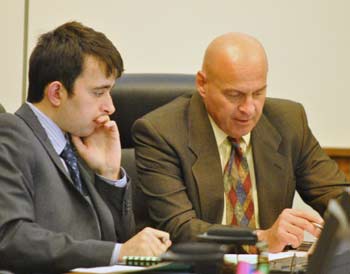
Curt Hedger, right, is the county’s corporation counsel. He was talking with Pete Simms of the county clerk’s office prior to the start of the Oct. 17 meeting. Among other duties, Simms is responsible for taking minutes at the meeting.
Many commissioners expressed surprise at the county’s involvement in this way. Previously, the expectation was that the county would not be involved in the process after filing articles of incorporation – which occurred on Oct. 3 at the request of the Ann Arbor Transportation Authority. The Washtenaw Ride is an Act 196 authority, and is intended to create a much broader transit system than the current AATA. The process of creating a larger transit system has been in the works for more than two years.
There’s been some confusion and differing legal views regarding the process of forming the new transit authority. Letters of notification sent by the AATA in late September to all jurisdictions in the county referred to a statutory 30-day window starting with the filing of the articles of incorporation. But Act 196 also requires that the new transit authority itself notify jurisdictions, which also triggers a 30-day window for opting out. The statute makes clear that it’s the later of the two windows that is relevant. Because the new transit authority does not yet have a seated board, it has not yet acted to notify jurisdictions countywide. For a more detailed report on this issue, see Chronicle coverage: “Positions Open: New Transit Authority Board.”
At the county board’s Oct. 17 meeting, Hedger told commissioners that AATA had approached the county, as the incorporator of the new transit authority, and asked the county to send official letters instead of waiting for the new transit board to be formed. The county would do so as soon as the articles of incorporation become operational in early November, he said. That means letters would go out likely by Nov. 8, he said, which would create a 30-day “opt out” window that would close in early December. Jurisdictions are automatically a part of the new authority until their governing bodies take formal action. Since early October several township boards have already voted to opt out. From reports in assorted news outlets, those include the townships of Northfield, Salem, Manchester, Sharon, Superior, York, Dexter, Bridgewater and Augusta.
Hedger said he expects the letter, which hasn’t yet been drafted, will indicate that the new authority will honor the opt-out decisions that have already been made. But it also will inform municipalities that they could change their minds and rejoin the authority until the 30-day window closes in early December, he said.
Commissioners Dan Smith and Rob Turner, who have previously expressed reservations about the process, both noted that the county was not supposed to incur any costs in setting up the new authority – saying its only role was to officially file the articles of incorporation. They noted that this had been laid out in the four-party agreement between the county, AATA, and the cities of Ann Arbor and Ypsilanti. Now, it appears that staff time and postage costs will be paid by the county, they noted.
This is the relevant section in the four-party agreement:
6. Indemnification. AATA and its successor-in-interest The New TA shall indemnify and hold Washtenaw County, the Cities of Ann Arbor and Ypsilanti, their elected and appointed officials, employees, agents and volunteers harmless from and against all actions, liabilities, demands, costs and expenses, including court costs and attorney fees, which may arise due to their respective negligent, grossly negligent and/or intentional acts or omissions under this Agreement, and transfer or assumption required under this Agreement once the New TA is operational.
Hedger indicated that he doesn’t expect to spend a significant amount of time on drafting the letter, and will use the previous one sent out by AATA as a template. Commissioner Conan Smith noted that the county had pledged to ensure that municipalities would be notified, and if that simply means sending out 28 letters, then “I think we can foot the bill.”
There was some discussion about the need to notify each elected official individually, rather than just sending a notice to each of the township, village or city clerks in the 28 jurisdictions within Washtenaw County. That would significantly increase the number of letters that would be sent.
Hedger also noted that if the Washtenaw Ride board is appointed by early November, then that entity could take over the notification process. “But it doesn’t look like that will happen at this point,” he said.
Before any AATA assets would be transferred to The Washtenaw Ride, voters would need to approve a funding source – likely a millage that could come as early as May 2013. The requirement of voter approval is part of a four-party agreement – between Washtenaw County, the city of Ann Arbor, the city of Ypsilanti and the AATA – that governs the possible transition to The Washtenaw Ride.
Prater expressed frustration, questioning why the four-party agreement wasn’t being followed. ”Why don’t we just pitch it out? It’s absolutely ridiculous that we do these agreements, then they’re not followed.”
The day following the county board’s Oct. 17 meeting, the AATA board held its regular monthly meeting. Michael Ford, the AATA’s CEO, informed board members that the AATA would be reimbursing the county for any cost incurred from the mailing.
Public Transit Update: Regional Transit Authority (RTA)
Before the discussion about The Washtenaw Ride, Wes Prater had asked for an update about state legislation regarding a proposed regional transit authority (RTA) for southeast Michigan – the city of Detroit and the counties of Washtenaw, Wayne, Oakland and Macomb. Prater said he’d heard that board chair Conan Smith was involved, and he felt the board should get an update.
Smith replied that he didn’t have detailed information at hand. The legislature has held several hearings, he said, and there’s strong support for an RTA across the region. But the legislation hasn’t gotten much traction, Smith added. [In late September, Smith had testified at a Michigan House Transportation Committee in support of the RTA. The legislation will likely be picked up again after the Nov. 6 election, in lame duck session.]
Prater felt like he hadn’t received sufficient information about the effort. Since Washtenaw County would be included in the RTA, if it’s formed, he thought the board should be more involved, rather than just one of its members.
Smith said he could send other commissioners information and analysis that he has received about the issue, noting that there have been multiple iterations of the RTA legislation over the past year. He also told Prater that Barbara Bergman and Yousef Rabhi had been appointed to an advocacy group about a year ago. When Prater asked when that had happened, Rabhi said that it had occurred at a board meeting.
By way of background, at its Sept. 21, 2011 meeting, the board unanimously passed a resolution of support for the RTA, but no appointments were made at that time. [.pdf of RTA resolution] From The Chronicle’s report of that meeting:
The context for the resolution is a Sept. 30 southeast Michigan regional summit that Washtenaw County has been invited to participate in for the first time. In past years, the summit included Detroit and the counties of Wayne, Oakland and Macomb. This year, Washtenaw and St. Clair counties will be included, and the topics will focus on regional cooperation and transportation. Smith and [former District 7 commissioner] Kristin Judge have been participating in the planning stages on Washtenaw County’s behalf.
The resolution cites the benefits and goals of regional transportation, including transit options along the Ann Arbor to Detroit corridor, and connections to Detroit Metro and Willow Run airports. It notes that state Sen. Rebekah Warren (D-Ann Arbor) – who is married to Conan Smith – has introduced legislation as part of a bipartisan package to create a regional transportation authority.
The main resolved clause of the Washtenaw County resolution states: “Be It Therefore Resolved that the Washtenaw County Board of Commissioners supports the creation of a new Regional Transportation Authority to enhance interconnectivity among the communities of the southeast Michigan region and urges the participants in the 2011 Southeast Michigan Regional Summit to aggressively pursue work that meets the above outlined goals.”
Responding to an email query from The Chronicle following the Oct. 17 meeting, Smith clarified that he was referring to an advocacy group called R-PATH (Regional Partners Advocating Transit Here). It’s unclear when Rabhi and Bergman were appointed, but they both filed R-PATH meetings – in January and February of 2012 – as part of their “flex account” statements. Each commissioner has $3,500 per year in their account to cover reimbursements for travel, per diem and other approved expenses. [Update: The resolution appointing Rabhi and Bergman was approved as part of the board's overall appointments process in January 2012.]
At the end of the discussion at the Oct. 17 meeting, Rolland Sizemore Jr. said he’d like to have a working session on this issue. Smith suggested asking Kirk Profit, a lobbyist for the county, to attend the board’s Nov. 7 meeting and give an update.
Prater reiterated that the board should be informed, and that he didn’t want them to be taken by surprise. If the RTA is established, it’s important to know how it will be funded. The transit authority can’t be created without revenue, he said. “I think we all know that.” He wanted to know what it would cost.
Rabhi said he’d attended a meeting of the Washtenaw Area Transportation Study (WATS) earlier in the day. There, a liaison to SEMCOG – the Southeast Michigan Council of Governments – had given an update on the RTA status. A lot of people are unclear about what’s happening, he said, because it appears that much of the work is occurring behind the scenes. The initial plan put forward by Gov. Rick Snyder had called for vehicle registration fees to fund the RTA, he noted, but it’s not clear what the funding would be at this point.
Outcome: There was no vote – this was not an item on the agenda, and did not require action on the part of the board.
Accommodations Ordinance Change
Commissioners were asked to give final approval to an ordinance change that shifts responsibility for the county’s accommodation tax from the county treasurer to the county finance director. A public hearing was also held at the Oct. 17 meeting. Initial approval had been given on Oct. 3, 2012.
The ordinance amendment transfers a 0.7 full-time equivalent accounting job from the treasurer’s office to the county finance department, and amends the accommodation tax policy to clarify that the tax is only assessed against the actual price of a hotel, motel or other rental – not against other amenities that the business might charge its customers, such as Internet access or an extra cot in the room. [.pdf of ordinance amendment] [.pdf of amended accommodation ordinance] [.pdf of amended accommodation policy]
According to a staff memo, the changes are being recommended by the county’s accommodation ordinance commission (AOC), as well as the Ann Arbor and Ypsilanti convention and visitors bureaus, which receive funding from the 5% tax. In 2011, revenues from the tax reached nearly $4 million, and are allocated on a 75/25 percentage split to the Ann Arbor and Ypsilanti CVBs.
This is the second recent change to the accommodation tax ordinance. At its Aug. 1, 2012 meeting, the board amended the ordinance to exempt cottages and bed & breakfasts with fewer than 14 rooms, as well as individuals who occasionally lease out rooms. These types of establishments account for less than 1% of the total tax collected in Washtenaw County, according to a staff memo accompanying the resolution. Several owners of bed & breakfasts spoke to the board in favor of that amendment, citing concerns over the increased frequency of audits and general attitude of the treasurer’s staff, which they felt was unnecessarily contentious.
On Oct. 3, two people – both members of the local hotel association – spoke in support of the proposed change. No one spoke at the Oct. 17 public hearing.
Outcome: With no discussion, commissioners unanimously gave final approval to the accommodation ordinance change.
Coordinated Funding Program
A resolution to extend a two-year pilot program using a “coordinated funding” model to support local human services for a third year was on the Oct. 17 agenda.
The county is one of five partners in the coordinated funding approach, which aims to leverage the money better that public and private entities allocate to local nonprofits. Other partners are the city of Ann Arbor, United Way of Washtenaw County, Washtenaw Urban County, and the Ann Arbor Area Community Foundation. The county board originally approved the two-year pilot at its November 2010 meeting – see Chronicle coverage: “Despite Concerns, Coordinated Funding OK’d.”
The process has three parts: planning/coordination, program operations, and capacity-building. The approach targets six priority areas, and identifies lead agencies for each area: (1) housing and homelessness – Washtenaw Housing Alliance; (2) aging – Blueprint for Aging; (3) school-aged youth – Washtenaw Alliance for Children and Youth; (4) children birth to six – Success by Six; (5) health – Washtenaw Health Plan; and (6) hunger relief – Food Gatherers.
The total process puts $4.935 million into local human services nonprofits. The extension of the coordinated funding approach for a third year means that nonprofits receiving funding currently would not need to reapply for support. The extension by one year would allow for the evaluation process for the pilot period to finish, likely by early 2013. That evaluation is being funded with $70,000 from a private donor. The extension would also allow a better opportunity to provide the outcome data on the program so far, according to staff.
The Ann Arbor city council approved the one-year extension at its Oct. 15 meeting. A staff memo accompanying the county board’s resolution stated that the United Way of Washtenaw County and Ann Arbor Area Community Foundation have already approved the extension, and the Urban County executive committee is expected to vote on it at its Oct. 23 meeting.
Coordinated Funding Program: Public Commentary
Lily Au told commissioners that she hadn’t seen them in a long time, but she reminded them that she had previously attended their meetings and has been working on the issue of coordinated funding for years – she does not support it. She warned them to pay attention to the reallocation or redirection of funds. Usually, it’s related to someone’s personal benefit, she contended. From the beginning, she hasn’t agreed with the coordinated funding approach. She described it as immoral to take public funds and redirect them to private entities like the United Way. She pointed to what she sees as conflicts of interest – when former county commissioner Mark Ouimet served as president of the United Way board, and when the former president of AnnArbor.com did the same. It’s important to uphold integrity in the community, she concluded.
Coordinated Funding Program: Board Discussion
Dan Smith said he wasn’t thrilled with the one-year extension, but he would support it. He was really looking forward to the report that will be ready early next year.
Wes Prater and Ronnie Peterson asked several questions about the process. County administrator Verna McDaniel clarified that the extension runs through June 30 of 2014. The board has already approved funding for 2013 – that happened in late 2011, as part of a two-year budget planning cycle. At that time, the board approved a line item of $1.015 million annually for coordinated funding. However, commissioners must take another vote to affirm the 2013 budget, with any modifications they choose to make. That vote will likely occur at their Nov. 7 meeting.
McDaniel told commissioners that at some point in 2013, they’ll be asked to approve additional funding for the coordinated approach for the period of January through June of 2014. The county’s budget is tied to the calendar year, but the city of Ann Arbor’s budget year runs from June 30 through July 1.
Peterson wanted to know how much funding was being committed by other partners. He felt that information should be part of the board’s deliberations. He said that while the county’s funding was set firmly, he believed support from other partners tended to “move.” [Sitting in the audience, Mary Jo Callan – director of the office of community and economic development, which oversees this process – shook her head no, indicating that this wasn't the case.]
Peterson said he wanted to be clear about what the partnership truly means. He was comfortable voting for the extension, but said that when the evaluation report is finished, he’ll bring forward some of his other concerns.
Outcome: The board unanimously gave initial approval to a one-year extension of the coordinated funding program for human services. A final vote is expected at the board’s Nov. 7 meeting.
Breastfeeding Policy
A policy to reduce barriers to breastfeeding in Washtenaw County facilities was on the agenda for approval at the Oct. 17 meeting. [.pdf of breastfeeding policy] The board had been briefed on the issue at a Sept. 20 working session.
The policy states: “In all County leased and owned buildings and property, and at all County-sponsored meetings, regardless of location, a mother may breastfeed her baby in any location, public or private, where the mother and her child are otherwise authorized to be.” There will be ”Breastfeeding Friendly” signs installed to promote the policy.
The goal is to promote “health, nutritional, immunologic, developmental, social and economic benefits for infants, mothers, families and communities” that are associated with breastfeeding, according to a staff memo.
Breastfeeding Policy: Public Commentary
Keleigh Lee of Superior Township introduced herself as a board-certified lactation consultant, and she thanked the board for supporting this breastfeeding policy. She has worked with hundreds of women, and many of them face an uphill battle – it’s hard to get started with breastfeeding, she said. So it’s sad to see many women quit doing it. The percentage of women breastfeeding drops from 80% to 15% within six months. She’s happy to see barriers removed, so that women can feel more comfortable breastfeeding.
Outcome: Without discussion, commissioners unanimously approved the county’s breastfeeding policy.
Apportionment Report
A preliminary apportionment report for Washtenaw County – giving details of the 2012 taxable valuations for property in the county, by municipality – was presented to county commissioners at their Oct. 17 meeting. The report also includes the amount of millages levied and the dollar amounts collected in taxes. December tax bills will be mailed out to property owners based on these calculations.
In April, the county’s equalization department produces an annual report describing Washtenaw County’s total equalized (assessed) value of property. The report is part of a state-mandated equalization process, and gives an indication of how much revenue the county will receive from property taxes in the coming year. [See Chronicle coverage: "Report: Better-Than-Expected '12 Tax Revenue"]
Later in the year – in October or November – the equalization and property description department presents an apportionment report. [.pdf file of 2012 preliminary apportionment report] Like the equalization report, the board is required by state law to vote on adoption of the apportionment report.
This year, all the taxing entities in Washtenaw County will be levying in total about $621.687 million in property taxes – a slight drop from $622 million in 2011 and $639 million in 2010. The county alone will levy about $80.578 million this year, compared to roughly $81 million in 2011 and $83 million in 2010.
The amount of money generated for the city of Ann Arbor through its millages will be increasing, due to the slightly increased valuation in Ann Arbor property values – from a total of 4,634,891,157 in 2011 to $4,683,218,542 in 2012.
Typically, Raman Patel – the county’s long-time equalization director – makes a presentation to commissioners with highlights from the report. He attended the meeting, but was not asked to address the board.
Apportionment Report: Board Discussion
Dan Smith was the only commissioner to comment on the report. He highlighted the graphic on the report’s back cover – which was included in the paper version that was distributed to commissioners, but not in the electronic version. It showed that of the total amount of taxes levied in 2012 countywide, 52.05% was levied for public education. Smith said he just wanted to point out that fact.
Outcome: The board unanimously voted to approve the preliminary 2012 apportionment report.
Communications & Commentary
During the evening there were multiple opportunities for communications from the administration and commissioners, as well as public commentary. Here are some highlights.
Communications & Commentary: Camp Take Notice
John Wagner of Ann Arbor spoke during public commentary about Camp Take Notice, reporting that he’s been a volunteer for the homeless community for about two years. He reminded commissioners that the camp had been closed this summer. [The camp had been set up on property owned by the Michigan Dept. of Transportation, off of Wagner Road near M-14. This summer, MDOT told residents that they couldn't remain on the land, and the group disbanded from the location in June.]
Wagner said that when the group left the site, there were about 70 members. Of those, about 35 have found housing, and that’s great, he said. But homelessness remains a significant problem, both statewide and in this community. As individuals, people who are homeless feel isolated. There are also safety issues, he noted. The alienation that people feel contributes to chronic homelessness, and doesn’t help an individual get reintegrated into the community. Winter is approaching, Wagner noted, and times are tough. He hoped the county would consider helping find a site – perhaps a county-owned facility – that Camp Take Notice could use to help people through this troublesome time.
Commissioner Rob Turner responded to Wagner’s comments, referencing a recent meeting that he had attended with camp residents at the University of Michigan. [Turner had described this meeting in more detail at the board's Sept. 5, 2012 meeting.] He reported that some commissioners – including Leah Gunn, Yousef Rabhi and himself – had met with camp members and volunteers, county staff and nonprofits that are involved in addressing homelessness, including the Washtenaw Housing Alliance. There was not uniform agreement about an approach, he noted, because the camp’s philosophy differs in some ways from other groups. But there are some areas of agreement, he added, and they’ll be meeting again in November. He described the county board as strong advocates to help the homeless.
Communications & Commentary: Retirement Funds
Rob Turner reported news related to the county’s two retirement benefits boards – for the Washtenaw County Employees Retirement System (WCERS) and the Voluntary Employees Beneficiary Association (VEBA), which handles retiree health benefits. The WCERS and VEBA boards had a joint meeting recently to review responses to a request for proposals (RFP) for actuarial services. The two finalists were the current actuary – Gabriel Roeder Smith & Co. (GRS) – and Buck Consultants. Turner said that the Buck proposal was far superior, promising to be more pro-active and aggressive in reporting out the conditions of the funds. It was a unanimous decision, he said.
Turner expressed concern about the fund balances, and looked forward to the county getting into a healthier position.
Wes Prater asked whether the county had received actuarial reports on WCERS and VEBA. County administrator Verna McDaniel reported that GRS had completed a report for WCERS, but the report for VEBA wasn’t yet finished – though it had been due “quite some time ago,” she said. [During a first-quarter budget update to the board in May 2012, Tina Gavalier – the county’s finance analyst – told commissioners that the reports would be completed by summer.] WCERS was 65% funded at the end of 2011.
Turner said the boards were concerned about the unfunded liabilities. He noted that if this were a plan in the private sector, they’d be required to address it. But because it’s a government plan, he said, the rules are different. It’s a big concern, he concluded, and the county needs to get its unfunded liabilities back in line.
Alicia Ping, who was chairing the Oct. 17 meeting, said that Yousef Rabhi would plan a working session on the topic in early 2013 – assuming that he would be re-elected as chair of the working session, she noted. The board elects its officers at its first meeting of 2013.
Communications & Commentary: Sylvan Recount
Rob Turner reported that he had attended the court-ordered recount of a ballot proposal vote for Sylvan Township earlier in the week. The vote ballot question – which was on the Aug. 7 primary ballot – was a proposal for a 20-year, 4.4 mill tax to repay debt on water and sewer bonds. [For more background, see Chronicle coverage: "County Board OKs Sylvan Twp. Contract."]
A recount had been requested following the narrow passage of the millage – 480 yes votes (50.37%) compared to 473 (49.63%) no votes. But during the recount on Sept. 4, the county board of canvassers determined that the ballot seal had not been appropriate and the recount didn’t proceed. That decision was appealed, and on Oct. 3 judge Archie Brown of the 22nd circuit court ruled that a recount could move forward within 21 days. The recount took place on the morning of Oct. 16.
Turner described it as a very interesting process, with no change in the outcome. He said he fully supported the recount, because the issue was festering. Several of his constituents have told him they feel relieved, Turner said, and it looks like the millage will be levied starting with the December 2012 tax bills.
Communications & Commentary: WATS
Yousef Rabhi gave an update as the board’s liaison to the Washtenaw Area Transportation Study (WATS). The board had previously been briefed – at a Sept. 20, 2012 working session – about a WATS policy committee that was looking at the possibility of WATS becoming its own metropolitan planning organization (MPO). Currently, it is part of the Southeast Michigan Council of Governments (SEMCOG) MPO. The committee had decided not to move forward with separation from SEMCOG, he said, so that issue is off the table. He felt it had been productive to discuss, because it had led to progress in capturing SEMCOG’s attention regarding problems that need to be addressed. The county’s concerns will be better represented on a regional scale, he believed.
Communications & Commentary: Thomas Partridge
Thomas Partridge spoke during the evening’s two opportunities for public commentary. He introduced himself as a write-in candidate for state representative in District 53, which covers Ann Arbor. [Partridge had lost the Aug. 7 Democratic primary to incumbent Jeff Irwin, pulling in 11.53% of the vote.] Partridge advocated for support of affordable and accessible housing, transportation, health care and education, especially for the move vulnerable residents.
Recognitions
There were several formal recognitions made at the Oct. 17 meeting. Here are some highlights.
Recognitions: Domestic Violence Awareness
Felicia Brabec read a resolution that declared October as domestic violence awareness month and recognized SafeHouse Center for its work to help survivors of domestic violence. [.pdf of resolution] The nonprofit’s executive director, Barbara Niess May, was on hand and gave some brief remarks, thanking the board and others who have supported SafeHouse over the years. She told them that the work saves lives, but there are more people that they aren’t yet reaching. She reported that local law enforcement leaders would be convening to unveil a new effort that would improve the response to domestic violence countywide.
Recognitions: Cooperatives
Yousef Rabhi presented a resolution recognizing 2012 as the International Year of Cooperatives. The resolution noted that there are several cooperative businesses in the county, including the Inter-Cooperative Council (ICC) of the University of Michigan; Forest Hills Cooperative Housing; Arrowwood Hills Cooperative Housing; Colonial Square Cooperative; Pinelake Village Cooperative; Ann Arbor Cooperative Preschool; Stone School Cooperative Nursery; First United Methodist Cooperative Nursery; University of Michigan Credit Union; Ypsilanti Food Co-op; and the People’s Food Co-op in Ann Arbor.
Gaia Kile, vice president of the board for the People’s Food Co-op, spoke to the board briefly. Cooperatives have been recognized by the United Nations for playing an important role in economic development and in meeting human needs, he said. Because this type of business is values-based and focused on meeting the needs of its members, he said, they are “highly democratic economic institutions.” The hope is to turn cooperatives into the fastest-growing segment of the economy, Kile added, and he thanked the board for the recognition.
Rabhi noted that he used to live in cooperative housing. It changed his life, he said, and because it led him to run for office, he joked that it had changed the lives of other commissioners, too.
Present: Felicia Brabec, Leah Gunn, Ronnie Peterson, Alicia Ping, Wes Prater, Yousef Rabhi, Rolland Sizemore Jr., Conan Smith, Dan Smith, Rob Turner.
Absent: Barbara Bergman.
Next regular board meeting: Wednesday, Nov. 7, 2012 at 6:30 p.m. at the county administration building, 220 N. Main St. in Ann Arbor. The ways & means committee meets first, followed immediately by the regular board meeting. [Check Chronicle event listings to confirm date.] (Though the agenda states that the regular board meeting begins at 6:45 p.m., it usually starts much later – times vary depending on what’s on the agenda.) Public commentary is held at the beginning of each meeting, and no advance sign-up is required.
The Chronicle could not survive without regular voluntary subscriptions to support our coverage of public bodies like the Washtenaw County board of commissioners. Click this link for details: Subscribe to The Chronicle. And if you’re already supporting us, please encourage your friends, neighbors and colleagues to help support The Chronicle, too!





